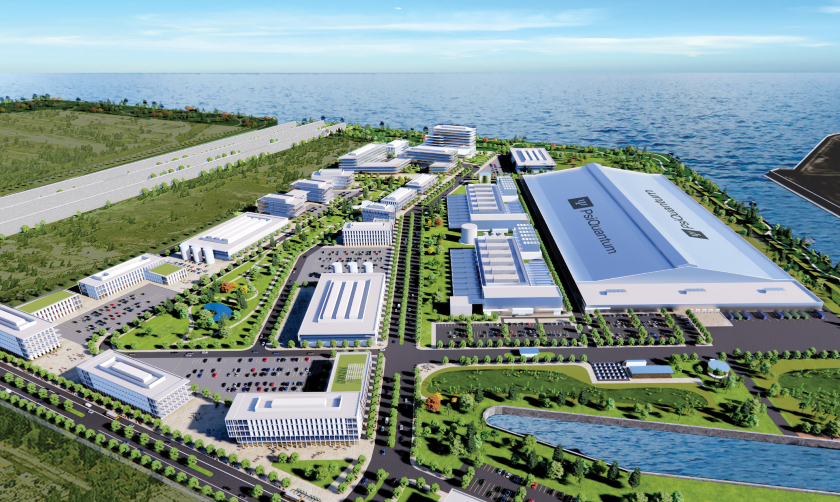Gov. JB Pritzker on Thursday announced that IBM will partner with the state to create a new national quantum algorithm center in Chicago — marking the first Fortune 500 company to join the soon-to-be-constructed Illinois Quantum and Microelectronics Park on the South Side.
It’s a huge win for Pritzker, who has for years sought to make Illinois a global leader in quantum computing and innovation. The announcement comes a day after the City Council gave the multibillion-dollar quantum computing campus final zoning approval.
The newly announced National Quantum Algorithm Center will be anchored by IBM’s modular quantum computer, called IBM Quantum System Two, which will try to advance quantum supercomputing across industries.
“The list of public and private institutions looking for a place in our quantum ecosystem is growing by the day, and Illinois is quickly becoming their destination of choice,” Pritzker said at a Chicago press conference. “As a reminder, being at the forefront of this industry holds the potential to deliver long-term, broad-based economic prosperity for our people.”
Beyond the potential advances in quantum technology, the center is expected to spur economic development — attracting scientists from across the world. Pritzker is also hoping IBM’s decision will continue to help advance federal research grants and private investments toward the quantum campus.
IBM’s investment will begin with 50 new permanent jobs, in addition to construction jobs for the new facilities. IBM CEO Arvind Krishna estimated the company’s initial investment to be “in the tens of millions, maybe it reaches the lower hundreds.”
“We are putting in a system that we don’t really put a commercial value on. It has got an incredible amount of R&D [research and development] and early manufacturing that’s going to go into it,” Krishna said. “More important is the number of people we’re putting in.”
Krishna said quantum computing has the capacity to do everything from helping fight climate change, creating better batteries, making food safer and stemming financial risks.
“All of these are problems that we believe are going to be within the reach of quantum computing in this decade,” Krishna said.
The new IBM center will operate temporarily out of Hyde Park Labs, a commercial science and tech hub affiliated with the University of Chicago. After the state’s quantum campus is built, the center will move to the 128-acre Illinois Quantum & Microelectronics Park. The 440-acre development will be completed in phases over the next four to six years.
Pritzker pushed to create the park, which will be financially backed by $500 million in state funding. Cook County is chipping in with about $175 million in tax breaks over the course of 30 years, and the city is kicking in $5 million.
California-based PsiQuantum plans to build the world’s first commercially useful quantum computer at the massive site, which has struggled to find development since U.S. Steel closed the South Works in 1992. According to the site’s developer Related Midwest, the first phase of the project will focus on the 128-acre park, anchored by PsiQuantum. Related Midwest will also expand access to more than 100 acres of parkland on the site — and they estimate that more than 20,000 jobs will be created through the park’s development.
In July, Pritzker announced the U.S. Department of Defense’s research and development agency, or DARPA, will take residency on the state’s quantum campus to establish a program where quantum computing prototypes will be tested.
According to DARPA, the goal of the “Quantum Benchmarking Initiative,” or QBI, will be to evaluate and test quantum computing claims and “separate hype from reality.”
The quantum campus will feature a cryogenic facility, which is needed for research and development for microelectronics and quantum technologies. It’s expected to generate up to $60 billion in economic impact, according to estimates from the governor’s office. It’s also expected to create thousands of jobs, but the governor framed it as having the potential of creating “tens of thousands and perhaps more, jobs.”
Chicago is already home to the Chicago Quantum Exchange, first launched in 2017 with Argonne and Fermi national laboratories, which now has one of the largest teams of quantum researchers in the world.
When he was mayor, Rahm Emanuel helped jump-start Chicago’s path to quantum development in 2018, announcing the University of Illinois at Urbana-Champaign would join the University of Chicago’s efforts in quantum technology with the Fermi and Argonne National Laboratories as part of the Chicago Quantum Exchange. In his more recent role as U.S. ambassador to Japan, Emanuel has helped secure multimillion-dollar research deals between the University of Tokyo and the University of Chicago.











